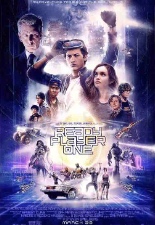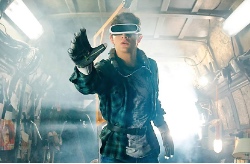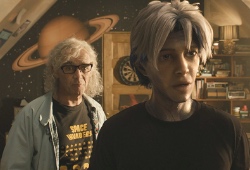
 Ready Player One is the $175 million embodiment of the adage about wishing to possess cake and consume it. Like a cruel parent with bipolar issues, the film spends two hours sparing no expense to tout its virtual-reality construct as something BuzzFeed might headline “You Guys! This Game Gives Me So Many Feels, I Can’t Even,” only to turn around and abruptly scold its audience for snapping at the cheese, let alone even sniffing it.
Ready Player One is the $175 million embodiment of the adage about wishing to possess cake and consume it. Like a cruel parent with bipolar issues, the film spends two hours sparing no expense to tout its virtual-reality construct as something BuzzFeed might headline “You Guys! This Game Gives Me So Many Feels, I Can’t Even,” only to turn around and abruptly scold its audience for snapping at the cheese, let alone even sniffing it.
And that’s if you buy into the showroom model Ready Player One presents. If you don’t, which is my case, the experience is even worse: an empty vessel of sensory overload.
In the vast wasteland that is America 2045 (just you wait!), the populace has become what Pixar’s WALL-E prophesied in 2008: lazy asses. Instead of participating in real-world activities, people strap on goggles and hide behind chosen avatars to spend their days and nights roaming around in OASIS, an immersive, anything-goes environment of VR fantasyland games and high jinks. Drive the Batmobile or the Back to the Future DeLorean! Wage war against Freddy Krueger and the Iron Giant! It’s like Second Life with a thumbed nose at copyright law and intellectual property.
 When OASIS’ dippy-hippie founder, Halliday (Bridge of Spies’ Mark Rylance, Oscar-winning porn star), passes away, he does not go gently into that good night. Rather, he makes his death and legacy a game, proactively bequeathing ownership of OASIS to one lucky player, Willy Wonka-style. Whomever can obtain the three keys hidden throughout his pixel-perfect world, wins.
When OASIS’ dippy-hippie founder, Halliday (Bridge of Spies’ Mark Rylance, Oscar-winning porn star), passes away, he does not go gently into that good night. Rather, he makes his death and legacy a game, proactively bequeathing ownership of OASIS to one lucky player, Willy Wonka-style. Whomever can obtain the three keys hidden throughout his pixel-perfect world, wins.
Poverty-stricken teen orphan Wade Watts (Tye Sheridan, Scouts Guide to the Zombie Apocalypse) vies to grab that bounty. His most formidable challenger: the ruthless, bullying corporate CEO/control freak Sorrento (Ben Mendelsohn, Knowing). The innocence of youth and plucky know-how vs. unchecked power and vast resources: We all know how this one will end — fictionally, of course.
The first key goes to the victor of an improbably speedy road race. Coming essentially right out of the movie’s gate, it kick-starts Ready Player One on a propulsive, well-boding note. Then the movie downshifts into narrative banality until the set piece for the second key — without question, the film’s most enjoyable sequence, as Wade and friends (including a love interest played by Ouija’s Olivia Cooke) enter The Overlook Hotel from Stanley Kubrick’s The Shining (Jack Nicholson not included).
 From that point on, with roughly half an elongated running time still to come, Ready Player One is a punishing sit. The quest for the third and final key occupies all of Act 3, culminating in an all-out CGI war among indiscernible sides and blink-and-gone pop-culture cameos (Robocop! Chucky! And, um, that guy!) Maybe this Trivial Pursuit: The 1980’s style works on the page — I have not read Ernest Cline’s 2011 best-seller on which this blockbuster is based — but given how the battle is entirely artificial, the effect is pummeling to a point of numbness. Your mileage may vary, dependent on how much you enjoy watching others play video games.
From that point on, with roughly half an elongated running time still to come, Ready Player One is a punishing sit. The quest for the third and final key occupies all of Act 3, culminating in an all-out CGI war among indiscernible sides and blink-and-gone pop-culture cameos (Robocop! Chucky! And, um, that guy!) Maybe this Trivial Pursuit: The 1980’s style works on the page — I have not read Ernest Cline’s 2011 best-seller on which this blockbuster is based — but given how the battle is entirely artificial, the effect is pummeling to a point of numbness. Your mileage may vary, dependent on how much you enjoy watching others play video games.
Ironically, the USP of Ready Player One becomes utterly meaningless well before the picture’s end: the four-word phrase “directed by Steven Spielberg.” America’s longest-reigning household-name filmmaker helped define the decade to which this film pays homage, if not worships. In the 1980s, a movie stamped with Spielberg’s name felt like a Spielberg movie, from the ones he directed (E.T., the first two Indiana Jones adventures, one-fourth of Twilight Zone: The Movie) to the ones he did not (Gremlins, The Goonies, Poltergeist,* Young Sherlock Holmes); whatever his capacity, each production bore That Spielberg Touch.
No more. If Ready Player One has a heart, it does not beat. Arguably half-animated, the film could have been directed by anyone, since it sparks no wonder, appears to confuse nostalgia with drama, and wastes the gifts of its actors. It is a chunk of digital plastic — tomorrow’s ColecoVision, today! —Rod Lott
